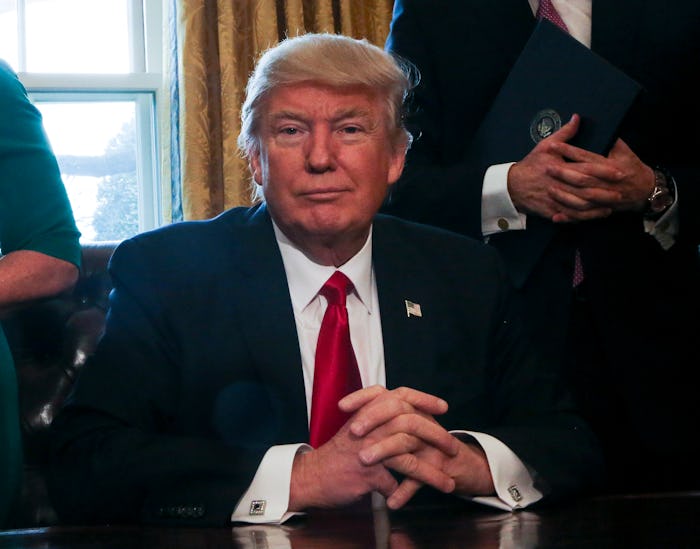News

Is Trump’s Immigration Order Still A "Muslim Ban"?
As promised, the Trump Administration on Monday unveiled its second attempt at an executive order to temporarily ban travel from several Muslim-majority countries, after its controversial first was blocked in court. The new order diverges notably from its chaotically implemented predecessor, which opponents soundly condemned as unfairly targeting Muslim travelers. But even though the revised version doesn't mention religion, excludes legal permanent residents, and leaves open the possibility for case-by-case waivers, critics are unmoved from their belief that Trump's immigration order is still a "Muslim ban." But of real concern to the president is whether it will do a better job of holding up to legal challenges than the original. The White House has not responded to Romper's request for comment regarding allegations that the order still targets Muslims.
Since President Donald Trump first signed the order back in January, he and his people have worked to convince the public that its goal was not to single out Muslims, but to protect the United States from the threat of terrorism. But the ban inspired protests nationwide and was soon blocked by multiple courts. Now, the United States will not issue new visas to people from six of the seven countries originally implicated for 90 days starting March 16, according to The Washington Post. In addition, the entire refugee program is on a 120-day hold; long-term, the country will welcome just 50,000 refugees annually compared to the 110,000 of President Obama's tenure.
In announcing that the new executive order had been signed on Monday, Secretary of State Rex Tillerson sought to reassure "our allies and partners around the world" that the new ban is nothing more than a vital piece of the country's efforts to "eliminate vulnerabilities that radical Islamic terrorists can and will exploit for destructive ends," according to CBS News. This is reportedly why Iraq got knocked from the list this time around; the country's leaders, Tillerson said, have agreed to implement new security measures. Such was not the case for Iran, Sudan, Somalia, Libya, Syria, and Yemen — the countries that remain the targets.
Despite this renewed and more tightly focused emphasis on national security, the temporary travel ban is still a "Muslim ban" to those to oppose it. And that remains true for them even though the new version of the order dropped the language in the order that grants preference to travelers from these Muslim-majority countries who belong to a religious minority — a major point of contention with the courts the first time around.
Omar Jadwat, director of the ACLU's Immigrants’ Rights Project, was among the first to weigh in via a statement:
The Trump administration has conceded that its original Muslim ban was indefensible. Unfortunately, it has replaced it with a scaled-back version that shares the same fatal flaws. The only way to actually fix the Muslim ban is not to have a Muslim ban. Instead, President Trump has recommitted himself to religious discrimination, and he can expect continued disapproval from both the courts and the people.
The charges that the ban is an attempt to bar Muslims from entering the country is a tough one for the Trump Administration to shake, given that the president himself proposed doing just that as a candidate. More recently, former New York City Mayor Rudy Giuliani said in an interview after the original ban went into effect that Trump had asked him how to legally implement a Muslim ban.
That, along with the fact that neither the previous nor current versions of the ban will bar anyone from countries actually responsible for deadly terror attacks here since 2001, set off alarm bells among Democrats in Congress, too.
Both senators from New York railed against it on Twitter. Kristen Gillibrand blasted it as "coldhearted, discriminatory, and detrimental to our security" specifically using the #MuslimBan hashtag to describe it, while Sen. Chuck Schumer referred to it as #MuslimBan2 in calling for its repeal. Muslims in Congress were similarly outraged.
"It's a Muslim ban," one of them, Minnesota Rep. Keith Ellison, told CNN. "It's a revised one. It's a lawyered up one. The man said he wanted a complete and total ban of Muslims ... He is trying to restrict access to the United States because of their religion."
If Ellison is right, we can be all but certain that the new travel ban will soon go the way of its counterpart.